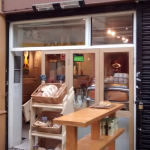To build your business in a rapidly changing scene in recent years is a result of technology and economic conditions.
Many new and small businesses now work from home. If that’s not for you, there are options to choose that can accommodate your business.
 To make this choice consider, in addition to “all in” costs:
To make this choice consider, in addition to “all in” costs:
- How scalable do you intend the business to be and when you expect to expand?
- What facilities do you need?
- How do you intend to meet clients?
All this helps you decide the type of property you need and how accessible and presentable it is. Also don’t forget that business premises bring you in contact with potential customers and can provide valuable support services.
What are the principal options when choosing business premises?
 One negative factor is that availability of starter office space above high-street shops in secondary locations are lower than ever, due to allowed residential development.
One negative factor is that availability of starter office space above high-street shops in secondary locations are lower than ever, due to allowed residential development.
Serviced accommodation
There has been a gradual move over recent years towards serviced accommodation for start-up businesses of up to six people requiring office space, usually in large, modern or refurbished buildings, with onsite management and support services.
These providers offer flexibility for start-ups, from a desk in a shared communal office area to whole floors of an office building. So you have the ability to expand as you build your business. Also, the networking opportunities in the same building can be a great help in the beginning, especially coming from a large company culture.
Contract lengths vary between 3 and 12 months. Longer terms are available depending upon the location. Expect to pay a fully inclusive monthly rental in advance to include all services (lighting, heating, power, rates and rent) based on space size.
 Onsite services can include meeting rooms (available by the hour), secretarial support, fax, telephone and photocopier, Wi-Fi and IT support.
Onsite services can include meeting rooms (available by the hour), secretarial support, fax, telephone and photocopier, Wi-Fi and IT support.
Some larger multi-site operators provide “drop-in” facilities at any of their centres on production of your membership details – ideal for dealing with clients in various locations.
Need more space
Serviced accommodation may still be an option. Light Industrial stand-alone units may be available in a small industrial park still on flexible terms. You will probably have to take a ‘proper’ commercial lease depending how the location is managed. Owners need to ensure they keep high occupancy rates. However, a shorter term lease inclusive of rates, rent and service charge may be possible especially if it has stood vacant for a while, as landlords want to have it occupied.
Other options may include subdivided larger industrial units or Solus Sites, (farm buildings or road side property) which can be adapted to your use. Depending upon the terms available, including rent and service charges you should consider buying the freehold, if it’s available.
If you are a retailer
 A “retailer” selling products or services to the public needs to have a shop visible to their customers in a prime high street (footfall) or a secondary (destination) location. Consider railway stations or other transport hubs for the high foot traffic that these locations generate to build your business.
A “retailer” selling products or services to the public needs to have a shop visible to their customers in a prime high street (footfall) or a secondary (destination) location. Consider railway stations or other transport hubs for the high foot traffic that these locations generate to build your business.
If you’re looking to trial an offer, a temporary base at a street market (whether it’s weekly, fortnightly), can be attractive to new businesses as set-up costs are very low. Pick the right well-managed market to get high footfall at a reasonably low cost.
With indoor markets a pitch can be negotiated on an all-inclusive short term licence usually on a monthly or weekly basis. The set up costs should be fairly small. Other options of semi-permanent market pitches are small shop or kiosk units within a covered market.
Locations like this are generally available on a monthly or three monthly licence. Although costs will be higher, they will still be considerably lower than a high-street shop unit, giving you a lot more flexibility in how long you keep the unit whilst minimising your potential investment.
If this doesn’t work for you, consider other location options to acquire a standalone high street shop unit that normally may not be possible.
Perhaps a pop up shop?
In locations where shops have been vacant for a while, or a shopping centre which struggles to be fully let, there may be opportunities for a ‘pop-up’ shop to build your business, if you can persuade the landlord to take a risk with your new business.
 A “pop-up shop” is one that looks like a regular fitted out shop but can be easily installed or removed at low cost without damage to the building. Once terms are agreed (sometimes just paying the rates and service charge) the duration is commonly between six weeks and three months.
A “pop-up shop” is one that looks like a regular fitted out shop but can be easily installed or removed at low cost without damage to the building. Once terms are agreed (sometimes just paying the rates and service charge) the duration is commonly between six weeks and three months.
This gives you an opportunity to have premises for a short period of time (e.g. the Christmas period is a good time to trial this, if you can find the right available space).
A food business though has restrictions imposed by local authorities and landlords making it a lot more complicated to establish.
Big businesses build very good working relationships with a number of landlords where they take a unit in a centre every year for a 3 month period (e.g. over Christmas) as it works for their business model. If your business has a seasonal potential then this might be a good long term strategy to try to adopt. However, to adopt the ‘pop-up’ route you need to be a reliable occupier with a good concept and be flexible with landlords and their agents.
Longer term options to build your business
If the pop-up option doesn’t suit your business and other semi-permanent options like mall-carts or kiosks don’t work for you then you will need to consider taking a longer lease on a standalone unit.
In taking this route you must be very clear on the implications for your business and the costs likely to be incurred before, during and after your occupation.
Acquiring a retail property is not something that should be entered into lightly. For a new business there’s a lot to consider:
- the condition of the premises,
- lease terms
- type of occupation
- rent
- lease-length
Get good advice
Regardless of property type, the best investment you can make is to take advice from a Surveyor. Get them to negotiate the terms, check the structure of the property and the repairing obligations in the lease.
Always get the lease or contract properly documented by a specialist property solicitor to ensure that your potential liabilities are minimised.
Remember, if you need a commercial property to build your business, keep it well maintained and managed for it to remain an asset. However, ignore it and it quickly becomes a liability that can mean the difference between success and failure of any business.
If any of the above resonates with you see how we can help with the property journey for your business. Please contact me here >>>


Recent Comments